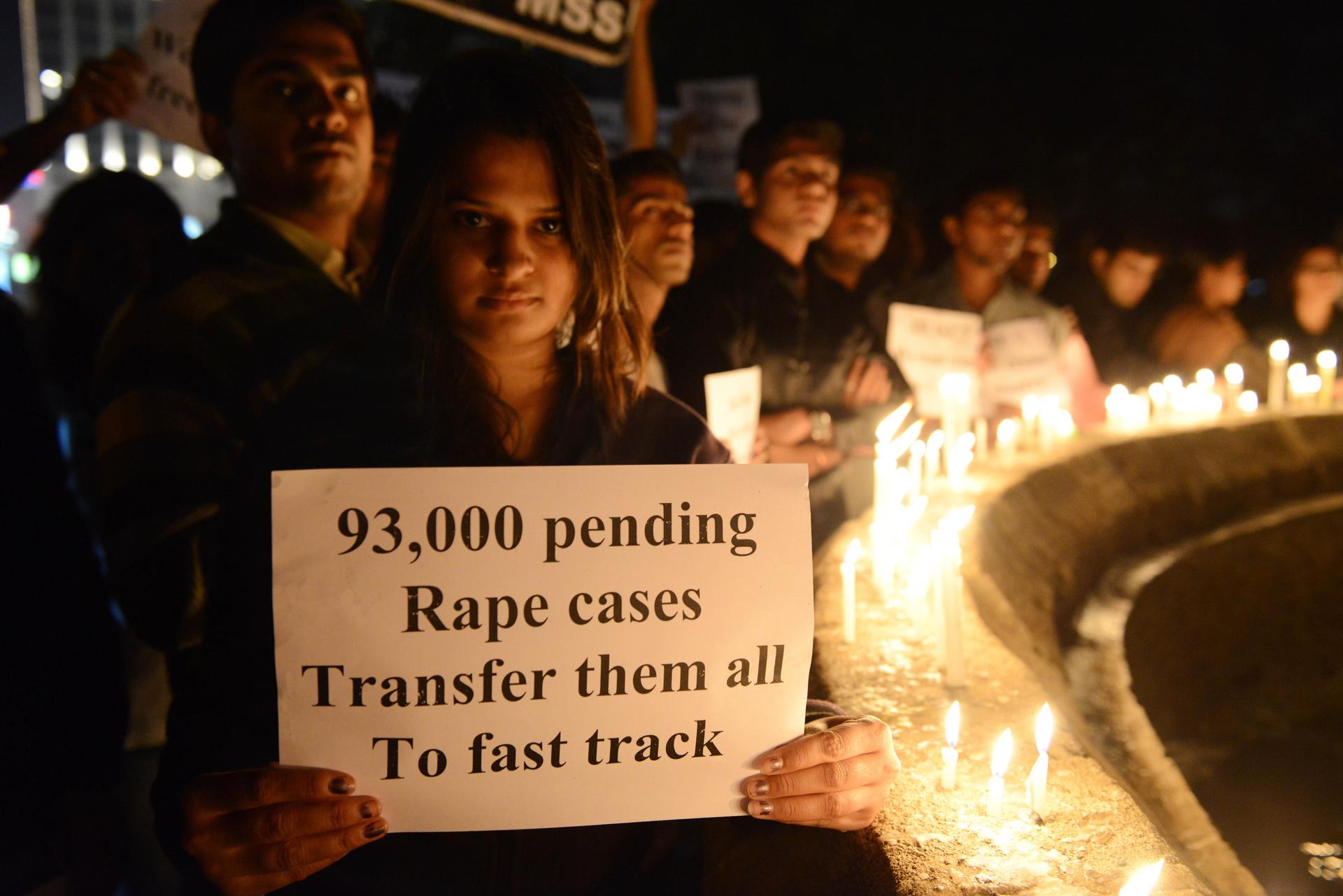Rape? Not on their watch!
Indian protesters hold candles and posters during a rally in Ahmedabad on December 30, 2012, following the cremation of a gang-rape victim in the Indian capital. The gang-rape and murder of the 23-year-old student has become the focus of nationwide protests.
The World Health Organization released a report in June calling the state of violence against women a “public health problem of epidemic proportions.”
One of the report’s staggering statistics revealed that one third of the world’s women are subjected to physical or sexual violence by a partner or stranger.
But vigilantes and "superheroes" are working to change that, emerging on the streets of Mexico, Egypt and India, battling the onslaught of rape and sexual harassment.
MEXICO
Violence in Mexico’s Ciudad Juarez has fallen since 2010—when it was considered the world’s murder capital, with at least 800 women killed, raped or missing—but the hopeless criminal justice system combined with a history of vigilante violence has spawned one “shadowy female assassin who has terrified the city’s bus drivers”: Diana, Huntress of Bus Drivers.
According to the Washington Post, her first act came last week on August 28th at 7:45 am, when prosecutors say a “middle-aged woman with blond hair or a blond wig boarded a bus along a major city thoroughfare, pulled out a gun and, without saying a word, shot the driver in the head three times.”
The following morning at 8:20 am she killed a second bus driver on the same bus route, but first road with passengers for several blocks before shooting the driver from behind.
Just before firing, witnesses reportedly heard her say, “you guys think you’re so bad, don’t you?”
“We thought the first one was a crime of passion,” said Arturo Sandoval, spokesman for the Chihuahua state attorney general. “But after the second one, it began to look like a case of revenge.”
Just 24 hours after the second murder, local reporters received a statement signed by the Huntress, whose name comes from a Mexico City statue of a nude, bow and arrow-wielding Roman goddess.
The message reportedly said “the killings were meant to avenge sexual assaults by bus drivers” on women who work well into the city’s late nights.
“We work long hours into the night to support our families, and we won’t stay quiet anymore in the face of these acts that fill us with rage … a lot of people know what we suffer, yet no one defends or protects us,” the message said. “I am an instrument of revenge for several women. Society may think that we are weak, but in reality we are brave and if we are not respected, we will make ourselves respected. Juarez women are strong.”
EGYPT
A new hero is challenging the perpetrators of violent sexual crimes, which have been rising since the 2011 fall of Egyptian President Hosni Mubarak, and have become well-known obstacles for women in Tahrir Square—the main sight of ongoing political activity in Cairo.
Qahera, the “butt-kicking, veiled heroine” in a comic created by Egyptian artist Deena, patrols public spaces, fighting both vicious mobs and inactive bystanders.
With the World Health Organization reporting that one out of three women will face sexual or physical violence, Egyptian women are proving they will not simply stand by and allow it.
There has been an eruption of creative initiatives since the beginning of political unrest, which use art to draw awareness to issues of sexual harassment and call on Egyptians to stand united against them. Groups like Tahrir Bodyguard and Op Anti-SH also document attacks and attempt to protect vulnerable women in public spaces.
Back in March, France 24 reported on another superhero comic inspired by Superman.
“I put a bit of myself in the character of Supermakh, and also a bit of the average Egyptian who would like to do something but is not always able to help out,” Makhlouf, the creator of Supermakh, told France 24. “It’s a superhero who succeeds, but not every time…”
INDIA
India-based anti-sex trafficking and women empowerment initiative “Save our Sisters” recently revealed a new ad campaign, which depicts Indian goddesses as victims of domestic abuse. The ads aim to capture the paradox of India’s treatment of women: “that of revering women in religion and mythology, while the nation remains incredibly unsafe for its women citizens.”
Buzzfeed this weekend published some of the campaign's images—recreated scenes from traditional hand-painted portraits of goddesses, only with cuts and bruises on their faces—created by ad agency Taproot. Each ad includes a phone number victims can call to report abuse to Save our Sisters.
“Pray that we never see this day,” the campaign stated. “Today, more than 68% of women in India are victims of domestic violence. Tomorrow, it seems like no woman shall be spared. Not even the ones we pray to.”
Every day, reporters and producers at The World are hard at work bringing you human-centered news from across the globe. But we can’t do it without you. We need your support to ensure we can continue this work for another year.
Make a gift today, and you’ll help us unlock a matching gift of $67,000!
